All Systems Are Outdated!

The distance between nature and humanity is increasing, with most of humanity living in a separate existence to nature. We seem to have forgotten that we are a part of nature but have gradually become more and more distant from it. We have a mutual relationship with it. We are nature, and nature is us..

Introduction.
This article applies to government agencies, emergency services, corporations, companies, businesses, firms, stores (online and physical), and charities. Organization in this context goes by the definition of a group of people working in an organized way.
How did work begin?
For decades, people have followed a set pattern in life, and work is a very big part of it. This series of articles focuses on people and their interactions with various systems. Without giving a history lesson on archaeological periods, this article briefly observes how humans, over thousands of years, have altered their perception of work.
There was a time in human history when people were self-sufficient. Early humans were completely self-sufficient because they had to be. People worked in small groups to obtain the essential things they needed to live. Work involved people obtaining their own food and water, producing their own clothing, and building their own shelter. Work also involved making it easier to carry out these tasks, for instance, by making tools. A side note: There are still parts of the world today where groups of people choose to live self-sufficiently, although modern systems are making it harder for them. Related link: Indigenous peoples.
Self-sufficiency in this context refers to people living self-sufficiently and not nations importing less products from other countries because of geo-political issues; it's not about self-sufficient economies.
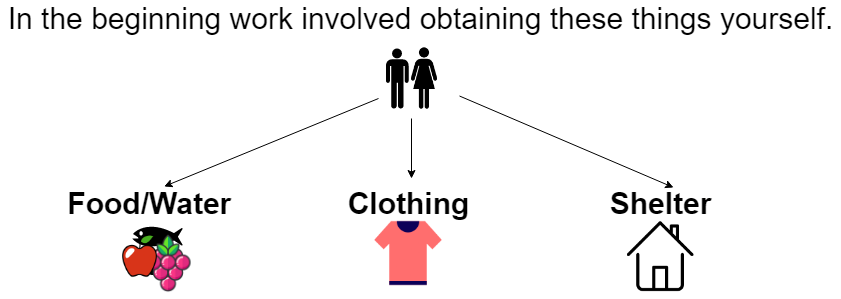
Detachment from nature.
Over thousands of years, humans became less and less self-sufficient. The increase in population, the creation of currencies, advancements in technology, the creation of governments, and the class system We then have a model of work closely resembling this diagram below. The basic needs of food and water, clothing, and shelter remained the same; however, the way people obtained those things relied on other entities. We can call it progress or something else, but we were no longer self-sufficient. People had to perform various types of work to earn money to meet their basic needs. We became dependent on various systems.
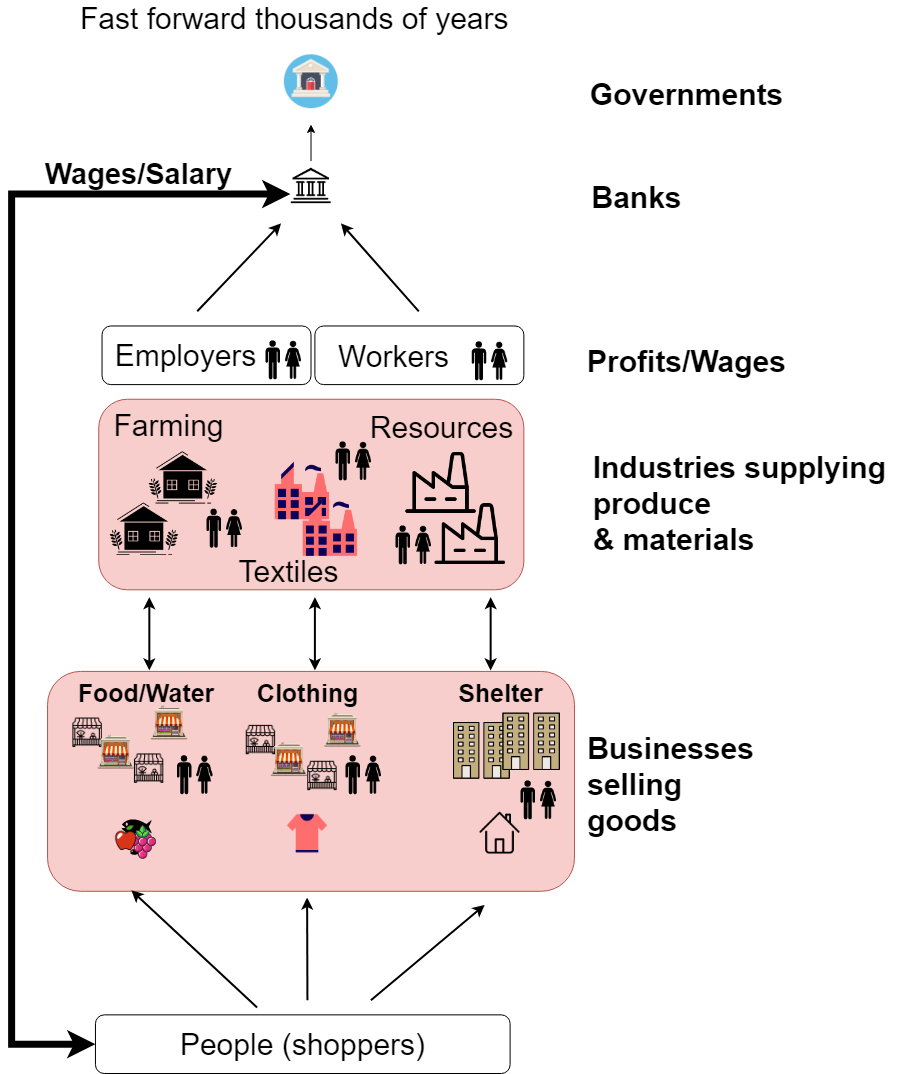
A matter of convenience.
As new technology was created, it became more convenient for people to obtain things. People did not have to go looking for food and water; they did not need to make their own clothes or build their own shelter. This way of living brought convenience, and people slowly adapted to it, but inequality and divisions meant millions did not receive the benefits of new innovations. Inequality and divisions because of class and race In this context, the class system also includes caste systems.
A side note: This convenience of obtaining the basic things needed to live did not reach the entire global population. Even in 2022, there are still famines, water scarcity is a big issue in many parts of the world, and living conditions are very basic. Related articles: World water scarcity and World hunger facts.
"Half of the world’s population could be living in areas facing water scarcity by as early as 2025." - unicef
Work during Colonialism (Forced or slave labor)
During Colonialism, the colonialists built infrastructure around the world to benefit their own ventures rather than helping native people; in fact, the colonialists exploited the native people to build infrastructure. This point is made to highlight that, in the past, work also involved large scale use of forced and slave labor by organizations.
Modern day slavery.
Even in 2022 there is still modern day slavery. Related link: Anti-Slavery website. A common example is the production of goods. Some parts of the world suffer so that other parts of the world can enjoy the products. This is not the fault of unknowing consumers; it is completely the responsibility of the organizations producing the goods or services to ensure the people helping them make their profits have the best quality environment to work in. It is only when such poor practices are discovered by third-party organizations that actions are taken, by which time millions and billions of dollars have already been made in profits. To make balance sheets look golden, produce cheaply and sell high is the mantra. Consumers that are aware of poor practices by an organization are faced with difficult decisions because, usually, the organization has grown so big that they have little choice but to use it. Consumers tend to use what's most convenient to them, but the moral thing is that when organizations do not operate with human compassion, where possible, finding "permanent" alternatives sends the right message. It's hard to deter consumers from salivating at the thought of obtaining the next big fashion item or tech product. Related link: US senator slams apple, amazon, nike, enabling forced labor china, H&M, Nike and Primark use pandemic to squeeze factory workers in production countries even more and Inhumane working conditions.
Organizations and abuse of power.
In the past, organizations used slaves and indentured labor; this is not discussed in this article, but many internet articles discuss British, Dutch, French, and Portuguese East India Companies and their use of slave labor or indentured labor. The Spanish had similar organizations that operated under the crown. The way these companies operated showed a total abuse of power. Power to be globally dominant organizations and power over people. Slaves or indentured workers were not thought of as human beings under these companies. The last of these companies stopped operating only 147 years ago, but some of the traditions and culture of these companies lived on in subsequent institutions and companies long after they stopped. Organizations wanting to be powerful have never stopped. The only difference in modern times is that it takes on a different form. There's competition between the smallest shop owners all the way to the largest organizations, and this is considered normal.
The illustrations in this article show how humans went from being completely self-sufficient to progressively becoming completely dependent on other entities. In the modern day, some people have realized the need to become self-sufficient again or partially self-sufficient. Most of these people are either doing this because they are dissatisfied with current systems, because of climate change, or because of a combination of the two. Many others are choosing simple living—living with just the essential needs—and others are increasingly having to live with just the essential needs out of necessity; they cannot afford to live any other way.
From complete independence to complete dependence.
Over thousands of years, technological progress created more industries, and this created more types of work. An ever-growing global population means a greater demand for every natural resource to sustain the basic needs for food, water, clothing, and shelter.
For most parts of the world, providing people with their basic needs was no longer a problem; however, the increase in the global population led to a greater demand for food and water, clothing, shelter, and the thousands of other products people buy, which resulted in a greater use of natural resources.
Organizations referring to government agencies, emergency services, corporations, companies, businesses, firms, and stores (online and physical), and charities The need to sustain a huge population created new industries and new places where people could work. We now have something closely resembling the present day. People had little choice but to be part of this perpetually moving machine (the rat race); they had to earn money to obtain their basic needs and were enticed into buying other products and services offered by these industries.
Humans solved the problem of acquiring their basic needs. Providing people with a better quality of life and making it easier to produce goods for lots of money was the new goal. New industries and markets sprung up to meet these new demands. New industries increased the requirement for work, and this requirement for more work led to longer working hours. Longer work hours introduced numerous health issues, which opened up a demand for specialized health services and leisure and recreational industries. The end goal for every entity, from the individual through the organization, is to obtain as much money as possible.
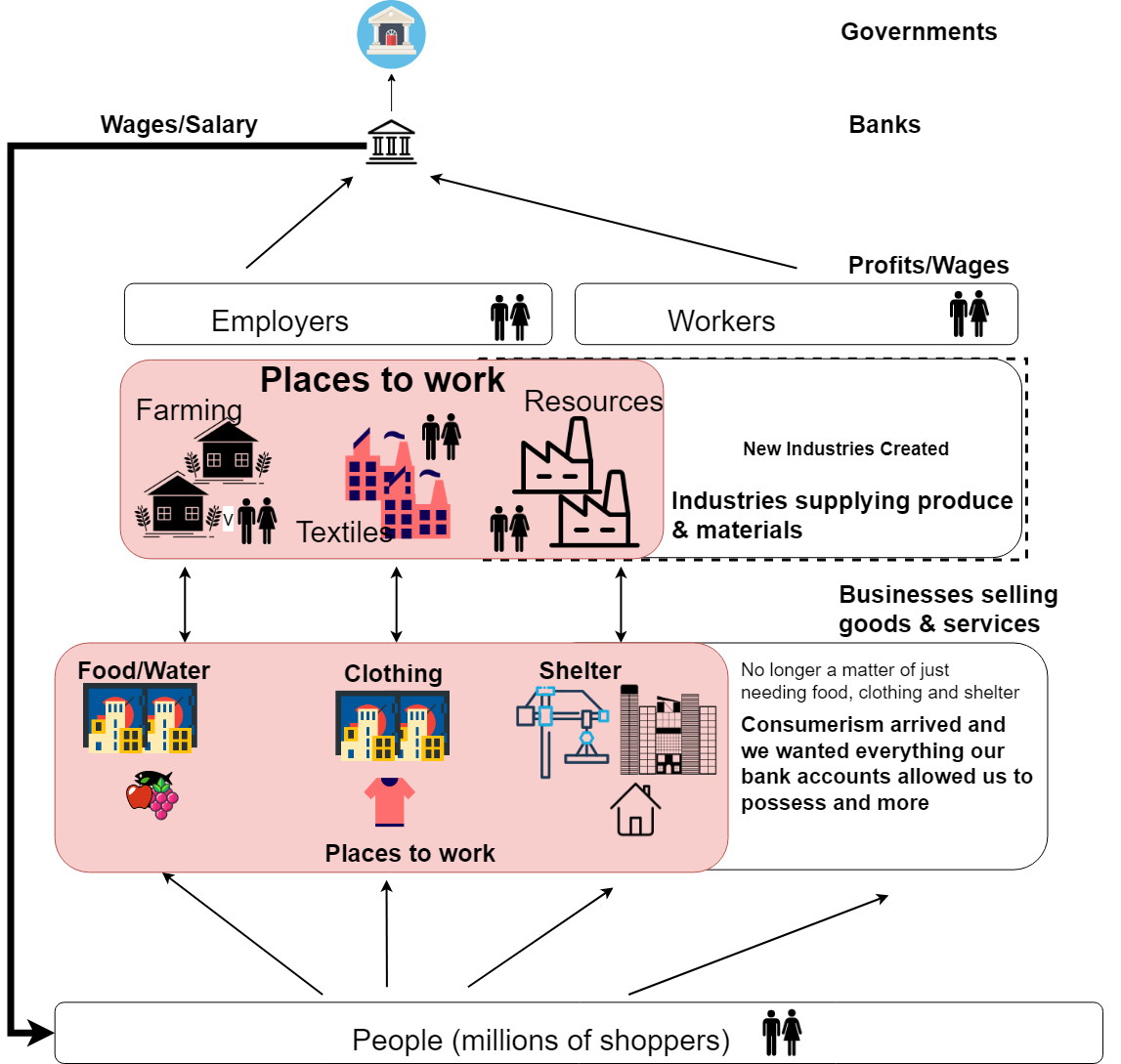
How has work changed people's behavior?
Attitudes have changed throughout the history of employment, but organizations are synonymous with one type of human problem or another, and these problems are still present today. Even centuries later, gender inequality and race inequality are still issues. Related link(s): Are businesses really tackling racial inequality? and Women are advancing in the workplace, but women of color still lag behind.
Outdated workplace structures.
We mentioned that large organizations are microcosms of nations; the hierarchy in large organizations can be compared to the social class system gone wild. At the top of this hierarchy is this godlike figure that everyone must look up to. The hierarchy in organizations compared to the social class hierarchy is generally the CEO, upper management, middle management, lower management, section leaders, team leaders, and employees. Just like social classes, there are varying levels of status and power. Large organizations have several more tiers of hierarchy than social classes. Related link: Reinventing Organisations: Frédéric Laloux’s transformation from corporate hierarchies to living organisms.
"The power games, the politics, and the infighting end up taking their toll on everybody. At both the top and bottom, organizations are playing fields for unfulfilling pursuits of our egos, inhospitable to the deeper yearnings of our souls" - Frédéric Laloux.
Just as people are not equal under social class systems, there is a similar element of superiority and power in work environments. The hierarchy model in organizations is wrong, outdated, and broken. Having any hierarchy results in different behavioral patterns between the hierarchies and creates inequality. People who are highly knowledgeable, skilled, and have high status usually earn more money. This creates conceit and egotism; these traits are generally extended outside of the organization. Many people with these traits portray themselves as having a higher social status than someone whose work does not require a certain level of knowledge or skill and is low-paid. Individuals who are highly knowledgeable, skilled, humble, and not arrogant understand that all people are equal inside and outside an organization.
There are other issues that are described in our article on Groups. The article describes issues of power, control, and ego within groups, which is precisely what organizations are; large groups divided into many smaller groups, each with its own hierarchy.
Observe the diagram below. The diagram shows the distinct types of behavior in the home, outside of the home, and at work. These different types of behavior patterns were described in the article on Groups. There will always be exceptions; for example, some people will have what they call their dream job, and 99% of dream jobs have no (chain of authority) power hierarchy, or the environment they work in feels like there's no chain of authority. There are also instances where individuals are very highly paid, and that outweighs the obstructive chain of authority; however, being highly paid can also create arrogance.
Different environments & human behavior
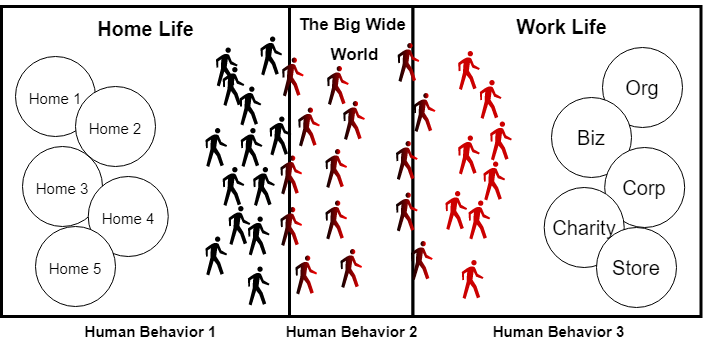
People feel most relaxed when they are at home and most comfortable with those around them. The home environment is where people generally show their true selves.
People's behavior outside of their home changes, and this is where people are said to have their guard up (be most careful and alert). There may be some cultural differences, but this is generally the case all around the world.
People's behavior changes with the environment they are in, and in the workplace, this varies depending on the length of employment. We can say this behavior is somewhere between the home and the big wide world. The work place environment people's self-image changes, and most people take on a different persona. Organizations are typically not places where people exhibit their natural behavior. Related link: Workplace stress silent killer employee health productivity.
The workplace is where people have to represent the entity they work for. There are rules to follow; there are usually several authorities to manage what people do; formal language rules are followed; there could be a dress code; workplace rules that reduce productivity; and all the other different behavioral aspects of working in a group. In this context, group is synonymous with team and department.

Depending on the length of time people have worked in a particular place, good relationships can be formed that go on to form work-place social groups. Behavioral patterns in this type of group are a lot more relaxed, and members of this group have more trust, cooperation, and empathy with each other. These types of social groups in the workplace also have a power structure within the wider group or department and can influence decisions. We discussed the herd mentality in our article on groups, the negative aspects of herd mentality are very active within businesses, companies, and organizations. Related link: Breaking down herd mentality.
Some people's view of organizations is that they seem to be working, the world is ticking along, and people's needs are being met. These types of sentiments are typically from people who have already earned a great deal of money through one organization or another. "Money talks". It is understandable for them to hold these views. The key words are "ticking along." Many organizations were fragile leading up to the pandemic, and when it hit, it was the catalyst that highlighted how fragile organizations are. During the 2020 pandemic, a vast amount of money was injected into the global organizational infrastructure to keep it "ticking along." Many organizations had to quickly devise different ways of working, largely due to complacency and outdated work methodologies. Prior to this, organizations thought updating the technology was enough; it's not!
The pandemic of 2020 was an unexpected wake-up call for many people, and this changed their views on many things. Related articles: The great resignation pew research finds tie in reasons workers quit their jobs in 2021 and Find out why 1 in 3 people want to quit their jobs.
From self-sufficient human beings to human beings that depend on earning money by working, people around the world work not only for themselves but to sustain the entire human population. This is what we refer to as the living entity of organizations. It did not have to be this way; over the centuries, it ended up this way, with one organization depending on another to continue functioning.
The essential needs for humans will never change; we will always require food/water, clothing, and shelter. The way people obtain these things has changed. People have to buy these things by earning money by working, and this is something they endure to maintain their essential needs. There will invariably be exceptions; see previous articles discussing the class system. Related articles: Financial Systems & Governments
What's wrong within organizations?
Worker/Labor unions are back in fashion...
Membership in workers unions has increased dramatically in the last 5 years. Organizations are not living up to worker expectations; they are unfair and untrustworthy. This is the reason for the rise in union memberships. We live in a world where employees have to follow the ruleset of organizations, whether they agree with them or not. People have heard the phrase "This is how we do things here." The power is in their hands, and the general thought is, "We are paying you money; we decide what's right and wrong." People need those essential things: food, water, clothing, and shelter, so their choices are limited. The fact that unions are needed should highlight how poorly some organizations function and how outdated the organizational model is. Related Link: Here's why labor unions are winning again and Why 85% of People Hate their Jobs?.
Large organizations are microcosms.
All the systems that control our world outside of an organization are similarly mirrored in organizations. Hierarchical structure, regulations, power, control, and money The number of groups in large organizations is taken to another level; at the top level, all the people that work for an organization are expected to be proud and represent the organization, with a godlike figure at the helm. Big organizations can be compared to the bureaucracy of a nation. There are groups at each of these levels: regional, area, department, section, and team. In each group, there is some type of authority, and usually when there is an authority of any kind, problems tend to arise. Additionally, group members contend for recognition from the authority. Related link: Why organizations without hierarchy really work.
The previous diagram shows people leaving the relaxed environment of their home and, in contrast, entering the controlled environment of the work environment. The controls have progressively increased over the decades. This is where people's behavior changes according to the particular workplace environment.
Most workers are under the authority of one or more people in the workplace. Individuals are employed for their specific skills, but they do not like to work under rigid and forced rules, especially when there are conflicting views on who should be carrying out the work. The bigger the ego, the greater the friction. Workers are constantly working under time constraints and rules on how they carry out the tasks and the tasks they should be doing. A clash of egos is a very common reason people end up unsatisfied with their workplace, and this kind of experience can alter an individual's behavior in the workplace. The exception to this is when someone is respected for their experience and knowledge and is satisfied learning from them. If the person with all the knowledge and skills adopts an egotistical attitude, then problems will still arise. For instance, if a person with all the knowledge and experience does not want to share it, believing it will devalue their status and position, Related link: Why employees don't share knowledge each other. The linked article provides a list of reasons but plainly put, individuals not wanting to share information is due to selfishness, fear, and a desire to retain value within an organization. It takes time and effort to gain knowledge, and sharing that knowledge readily is giving away something that has monetary and status value. There is selective sharing, where knowledge is shared with people of an equal knowledge level but not with lower-skilled individuals. Another reason knowledge is not shared is due to a personal dislike of an individual.
A trend that sprung up since the dot-com era was to try and make the workplace an environment more relaxed: throw-in fitness club packages, a pool table, a dart board, beany bags, and so on. For some, this may have created a more relaxing environment; however, this does not resolve how organizations operate at their core—the competition culture within them. Related link: Tech workers are on the move pool tables and perks wont be enough to keep them.
Competition is competition.
Small local businesses selling goods and services also have the urge to compete; two grocery shops or two flower shops on the same street always sought ways to outdo each other to attract customers to their shop. The big difference was that, although they competed against each other for business, they may have known each other well, and it was a community. They may have even recommended customers to each other's shops when something was not available. It was competition, but it was "fair competition" with social interaction between shop owners and customers.
The small business of yesteryear.
We must take into account that some small businesses of yesteryear became the colossal mega-giants of today. It did not happen overnight; maybe they were the first businesses of their type and people were limited in choice at the time. These businesses started to offer more variety and services for their customers and expanded. If the same opportunity ("bundle of money") presented itself to any small business owner, 99% of the time they would also jump at the chance of expanding their operation. Part of the problem small businesses have with big organizations that take away their business is that, whether it was through time or success, someone got there before them and made it big. When large businesses became firmly established, the smaller businesses could not compete, but if given the chance, the small business owners would switch places in a heartbeat. The point being highlighted here is that the human desire for power, control, and greed exists regardless of whether the organization is small or large.
Large organizations have become so successful that they have taken away or replaced many smaller businesses and stores. There is another gradual shift taking place, but it is not discussed in this article. However, a picture speaks a thousand words.
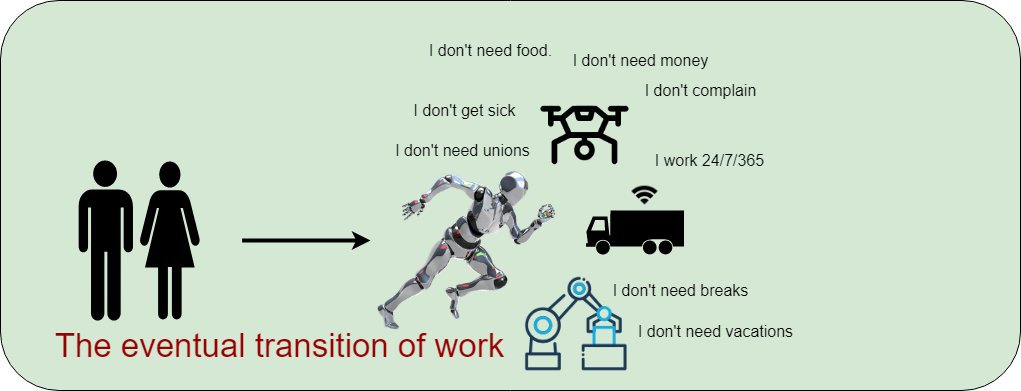
Small businesses being wiped out.
There was a time when people were able to buy from a number of small local businesses; there might have been several local hardware stores, bakeries, groceries, and various shops for all your needs. The owners of these businesses knew their customers by name and valued their business. This built a friendly local community. Now many local businesses have been replaced by enormous superstores that specialize in their particular market. The move to bigger superstores, along with technological advancements, have largely replaced the local family businesses or taken a lot of their business away. This trend validates the human need for power, control, and greed.
Loss of real social interaction.
Some might say, "What's wrong with getting all the things I need under one roof rather than multiple smaller shops?" It sounds great initially, but the superstores are progressively interested in getting more foot traffic and will throw in every piece of new technology to maintain that. Local businesses had more human interaction; it was more of a social experience (not a digital one). Human beings are social by nature (the pandemic lockdowns proved this), and social interaction with others would have benefited them psychologically. Instead, we have the ever-increasing "no feeling experience" at superstores, where soon you may not speak to anyone to purchase your item(s) or the entire process will be on The Internet with automated delivery via autonomous vehicles, a zero human interaction experience.
Organization reviews.
The fact that people are reviewing organizations and the need for others to see reviews of an organization should immediately highlight something. Namely, how much deceit must be going on that people need to resort to finding honest, trustworthy businesses through a review process?
The bigger companies fabricate reviews by paying people, and the smaller businesses will get their friends and family to review, and those reviews will always be positive, even when the service or goods may not meet high standards. One way or another, the entire review process cannot be completely trusted. Related links: Trustpilot legal action against company posting fake reviews and Can you trust online reviews here's how find fakes.
It is disheartening that people need to write and read reviews for businesses before utilizing a service or buying a product. In essence we are checking to see whether a business is trustworthy and whether it provides a good service or product. All these factors should be the foundation of every organization and business, without any review process. The entire review process is a waste of time. People painfully sift through good or bad reviews without knowing if they are fake, without really knowing if they can trust the review, and without knowing if the business will provide good-quality services or products. It is left to the individual to decide. It's Roulette.
Organizations and Businesses only want five-star ratings, and they'll do anything to get there. Their bottom line is to get your money; that's the reason behind all the deceit surrounding reviews. Organizations and Businesses get more money from your good reviews. What do you get for this extra effort to submit a review? Related link: UK businesses caught buying five-star Google reviews.
Too much distrust in organizations.
Even without reviews, rarely do people trust businesses 100% without any kind of concern." It would be great if all businesses had a verifiable ruleset and trust was never an issue. Instead, people find themselves having to go through the torture of trying to select a trustworthy business for their requirements and ensure the organization is not overcharging them or being deceitful. Many businesses thrive on obtaining full payment for online goods and services upfront without any guarantee of quality. Additionally, some businesses make it as difficult and awkward as possible to return the goods and ask for a refund because they anticipate that a high percentage of people will not make the effort to ask for a refund if they make the return process as convoluted and costly as possible.
Organizations includes Charites.
There is no denying that charities do amazing work. Charities are for giving help for all types of things, but that doesn't necessarily mean that charities always have good intentions and are fair, honest, and equal. When people donate to a charity, there is no 100% guarantee that the money will be used for an actual purpose. If there was end-to-end verifiable trust, there would be a lot more donations. An area that Blockchain technology can dramatically change. Related link: How can you be sure where ‘charity’ donations go?. Charities need to be in a place where people can precisely decide where their donations go and have the ability to track their donation.
If we consider all organizations around the world as a single living entity, it's a perpetually moving machine, and of course people and money are at the center of it.
We live in a world of organizations that compete, and the people that work in those organizations also compete. The driving force behind all this competition is money. For decades, this has been part of life, and for several generations, people have never known anything else; the typical pattern is achieving a good education, obtaining the best job with an organization, and then working to obtain the most amount of money.
Organizations do not encourage free thought enough. Large organizations are structured like mini-worlds, with similar structures of authority and power behind them. The structure is not something people think about; people routinely go about their work and follow the pattern to earn money.
If organizations were such delightful places to nurture the human spirit and soul, there wouldn't be so much deceit and corruption. Related link: List of corporate collapses and scandals without insolvency. The link lists just the high profile corruption from well-known organizations.
Organizations, businesses, or any entity that profits from selling services or goods should operate with complete honesty and trustworthiness from the outset. They should be transparent about their operations, including their charges and fees. How do they source their products? Where do their products come from? Simply take the guesswork out of everything for the customers. Decentralization using blockchain technology can help solve transparency problems.
The chain of authority that exists within organizations, the competition-based structure internally and externally The people that work in organizations compete for leading positions. The organization as a whole competes with other similar organizations in all this competition. Is it so organizations can revel in the glory of being the most powerful or profitable in the street, city, country, or world? If an organization's primary objective is power, status, or money, this is wrong. How about creating fair, equal, and valuable services for every person that utilizes an organization's services?
How did things get so bad? Organizations had to publicize slogans like "A people-first company" or "A people company." Assuredly, this should be the foundation of all organizations without having to publicize it. The people that typically come first in large organizations are the ones with the most authority; their pockets are lined with substantial bonuses and valuable stock offerings.
A side thought: What if organizations flipped the pay levels? So the janitorial jobs were the highest paid, and the CEO jobs were the lowest paid. This is intended to be thought-provoking and not humorous, because sadly, this is how society places a value on every human being...
Regardless of whether you are a small or large business, the desire to achieve status and power is there. The "competitive spirit" runs through the veins of our society and is drummed into people from an early age. Competition is inherent in nature. However, if humans have progressed technologically, then it is right to say we should have progressed psychologically as well. Through years of brainwashing, people are led to believe there has to be competition. Most people's goal in life is to be the best and accumulate as much as possible. This ideology is passed down through the generations because people are brought up in the systems we use today. People study a good part of their lives to potentially find the work they want and then attempt to gain as much money as possible to try and succeed in life. We should question what it means to succeed in life.
Check our article on Earth-Connected Organizations.
Next Time: Information & Media Systems...
The emotions you feel when looking at these pictures are what a mind without human-created systems feels like. As nature intended.


Main Page: Systems.
© Lightnetics 2024